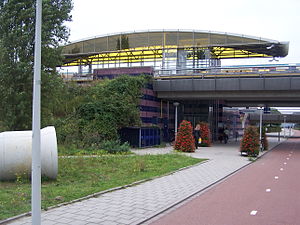Isolatorweg metro station
Isolatorweg | |||||||||||||||
|---|---|---|---|---|---|---|---|---|---|---|---|---|---|---|---|
| Amsterdam Metro station | |||||||||||||||
 | |||||||||||||||
| General information | |||||||||||||||
| Location | Amsterdam Netherlands | ||||||||||||||
| Coordinates | 52°23′43″N 4°51′2″E / 52.39528°N 4.85056°E | ||||||||||||||
| Operated by | GVB | ||||||||||||||
| Line(s) | 50, 51 | ||||||||||||||
| Platforms | 1 island platform | ||||||||||||||
| Tracks | 2 | ||||||||||||||
| Other information | |||||||||||||||
| Station code | ITW | ||||||||||||||
| History | |||||||||||||||
| Opened | 28 May 1997 | ||||||||||||||
| Services | |||||||||||||||
| |||||||||||||||
Isolatorweg metro station is the terminus of the Amsterdam metro 50 (Ringlijn) and opened on 28 May 1997.[1] From 3 March 2019 this is also the terminus of the Amsterdam metro 51. The station is a railway embankment near the Isolatorweg on an industrial estate close to an electric generating station in the western harbour area of Amsterdam. Since there are no nearby residential areas, the station attracts relatively few visitors. The station has an island platform in the middle of a central access. Isolatorweg is the third metro station in Amsterdam that does not have an escalator.
The station takes its name from the Isolatorweg street, which itself refers to the electrical isolator. Other street names in the area include Generatorstraat, Elektronstraat, and Magneetstraat.
References
[edit]- ^ Webb, Mary; Clarke, Jackie (April 2007). Jane's Urban Transport Systems 2007-2008. Jane's Information Group. p. 257. ISBN 978-0-7106-2816-9. Retrieved 23 April 2012.
